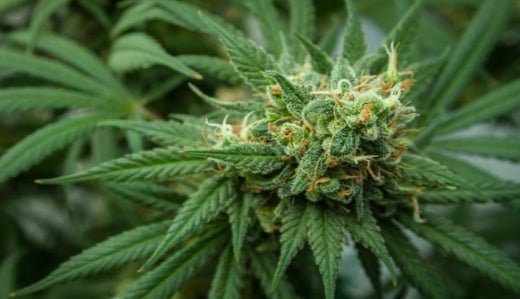Your Cart is Empty
FREE SHIPPING ON ALL ORDERS $75+
CBN, short for "Cannabinol," is one of over 100 recognized cannabinoids native to the cannabis plant.
It was actually the first cannabinoid to be isolated, way back in the 1980s, and researchers originally thought it may be responsible for cannabis’ psychotropic effects, a characteristic we now know belongs to THC.
Today, CBN falls under the classification of “minor cannabinoid,” unlike THC and CBD (which are considered major cannabinoids), because it appears only in trace amounts in most cannabis strains. Some evidence suggests that CBN only appears at about 25% of the concentration of THC.
Similarly to the major cannabinoids, CBN is found in most parts of the cannabis plant but is most heavily concentrated in the trichomes (tiny hairs) found on the plant’s mature flowers.
CBN is a “late-blooming” cannabinoid that isn’t controlled by cannabis’ genetic factors, but by the environment in which the plant is grown. THC converts to CBN when it is oxidized through exposure to heat and light.
Although seed geneticists cannot necessarily alter the cannabis plant to create a high-CBN strain, many producers have found interest in CBN because of limited evidence and various anecdotal claims that it provides special benefits, namely a sedative-like effect.
Ultimately, more research is needed to fully understand the potential benefits of this minor cannabinoid, but researchers and consumers alike are intrigued by CBN’s function, and many CBD industry leaders are utilizing it in special wellness formulas.
Table of Contents
How Does CBN Work?
CBN Effects
CBN Research
Will CBN Get You High?
Is CBN Legal?
Types of CBN Products
How to Use CBN
Does CBN Have Any Side Effects
Where to Buy CBN Oil
Resources
CBN may interact with the body through complex mechanisms as part of the Endocannabinoid System, the bodily system that promotes your overall balance of body temperature, appetite, pain signaling, and more.

In general, cannabinoids from cannabis (called phytocannabinoids) have a molecular structure that is similar to endocannabinoids, or a group of neurotransmitters in the body. Because of these similarities, cannabinoids are sometimes able to act on CB receptors in one way or another to trigger, or inhibit, certain responses.
CBN is thought to have a very low affinity for the CB1 receptor, or the portion of the Endocannabinoid System that is linked to the central nervous system (where psychoactive THC binds.)
Instead, researchers believe that CBN binds with CB2 receptors, the portion of the Endocannabinoid System that helps manage immune system responses.
These interactions are the reason that CBN may play a role in balancing the Endocannabinoid System and promoting overall wellness.
Because CBN is not readily available in the cannabis plant, it’s not generally harvested on its own. Instead, CBN is thought to be a powerful part of cannabis’ entourage effect, a theory that suggests that all cannabinoids and other cannabis compounds have synergistic effects when they are consumed simultaneously.
Although CBN is rarely taken on its own, we have some evidence and anecdotal reports that suggest that it has a variety of beneficial effects. Some reports suggest that CBN may have powerful antibacterial, neuroprotectant, anti-inflammatory, and sedative properties, though more evidence is needed to confirm these benefits.
The research regarding CBN’s health potential is mostly limited to small studies, but researchers are interested in this minor cannabinoid for a few different reasons:
A 2019 study investigated CBN's potential for managing pain caused by certain conditions, like fibromyalgia. The research found that CBN may offer significant analgesic relief for chronic muscle pain disorders.
Research also suggests that CBN may act as an appetite stimulant in mice. Experts argue about how animal studies translate to human trials, but this research suggests that CBN may be useful for managing appetite loss due to conditions like cancer or HIV.
Another study implies that CBN may have antibacterial properties that could be effective against bacteria, like MRSA, which is prone to being antibiotic-resistant.
In a study evaluating the anti-inflammatory effects of various cannabinoids, CBN was among the ones thought to offer potential anti-inflammatory benefits.
One well-cited study suggests that CBN, in combination with THC, may have prominent sedative-like effects. This research is the main reason that people found interest in using CBN for insomnia and other sleep-related issues.
A study dating back to 2005 found that CBN may have certain neuroprotective benefits. It was shown to potentially delay the onset of amyotrophic lateral sclerosis (ALS), a disease that causes muscle control loss.
Ultimately, CBN offers many of the same benefits as CBD, and multiple research efforts point to CBN's potential benefits when used in combination with other cannabinoids as part of the entourage effect.
Because we think CBN may act on the immune-regulating portion of the Endocannabinoid System, it's likely that future research regarding CBN will point towards its potential benefits for various chronic illnesses.
More research is needed, but learning about the most heavily-researched non-psychotropic cannabinoid, CBD, may help you understand CBN's full potential.

CBN does not cause psychotropic effects like THC. Although we don’t know everything there is to know about endocannabinoid reactions in the body, we believe that THC induces its psychotropic effects by binding with and activating CB1 receptors. CBN, however, is thought to have a low affinity for CB1 receptors, around one-tenth that of THC.
Similarly to CBD, CBN may be able to provide therapeutic effects without causing any type of intoxication, which may make it a more accessible option than some whole-plant, high-THC formulations.
Because CBN is a cannabis-derived compound, the legality is seemingly unclear. Luckily, CBN products can be made from legal sources, namely industrial hemp, which was removed from the Controlled Substances Act under the 2018 Farm Bill.
The bill effectively removed legal restrictions on hemp and all of its components, including naturally-derived cannabinoids like CBN. Still, the FDA has yet to supply manufacturers with a definitive list of regulations for hemp products, leaving CBN products in a legal gray area.
To put it simply, CBN is not illegal, but consumers should take special care to ensure that they purchase CBN products from legal, responsible sources.
Low-quality cannabinoid products can be ineffective and may even carry potential risks, so it’s important to carefully vet the CBN brand you choose. You can start by checking the brand’s hemp source, and then verify that they offer third-party lab analysis reports to the public, which is a document that verifies the amount of CBN used in each product.
Because CBN is not as readily available as CBD or THC, you’ll typically find a smaller variety of products available. Still, CBN can be found in multiple formulas, and many manufacturers have created unique, targeted formulations using this minor cannabinoid.

In general, CBN may be available in trace amounts in many full spectrum CBD products, but consumers looking to reap the specific benefits of CBN should look for special formulations, which will include larger concentrations of CBN than is typically found in full spectrum CBD oil.
The most common form of CBN you’ll find in today’s market is an oral oil, usually in combination with CBD or other cannabinoids.
Oils, when taken orally under the tongue (called sublingual dosing), are thought to have a greater bioavailability because they allow cannabinoids to be absorbed by mucous membranes under the tongue. This type of dosing bypasses the digestive process where some of the cannabinoid potency is filtered out by the first-pass effect, a crucial filtration process carried out by the liver.
This means that the absorption rate is potentially greater than other dosing styles, which is important because CBN is usually available in lower concentrations and may be more expensive, so you’ll want to absorb every drop you take.
For that reason, sublingual CBN products are more common than edibles or capsules, though you may sometimes find those types of products too.
The way that you use CBN products will vary based on the type of product you choose, but the idea is generally similar to the way that CBD products are used. Because CBN is not psychotropic, people tend to use it at many different points throughout their day, but you should tailor your dosing frequency to meet your own wellness needs.
For instance, those who want to use CBN for sleep should consider taking their dose near the time they want to go to sleep.
People may choose to take CBN for a number of reasons. Regardless of the reason, one thing rings true—the Endocannabinoid System is known for regulatory functions and thrives on consistency. Some research suggests that you should take CBD every day for the best results, and many sources assume the same about CBN.
Of course, there is virtually no research available to evaluate the benefits of different CBN dosing routines, so the best method may be to start slowly, record your results, and alter your dosing routine as needed until it works for you.
Read "CBN Dosage" to learn more.
Research regarding CBN’s benefits and potential side effects is still limited, which makes it difficult to speak on CBN's safety. However, no research has ever linked CBN to any type of toxicity, and it’s thought to perform more similarly to CBD than THC, so many people draw conclusions from CBD’s safety profile.
Experts believe that CBD is generally safe, but it may have some drug interactions and shouldn’t be used by people who are pregnant or breastfeeding until we have more information about its interactions.
If you're worried about the potential side effects of CBN, talk to your doctor.
Because of updated hemp regulations, cannabinoid products can now be legally made and sold across the U.S., making it easier to access CBN than ever before.
Unfortunately, many manufacturers have taken advantage of the lack of industry regulations, which essentially allow them to produce low-quality, cheap, or synthetic products and market them as premium products. This can make it difficult, and even risky, for consumers to buy CBN products without taking special precautions.
In search of transparency, many people turn to the internet to buy the CBN products they need. When you buy CBN online, you're able to get a better look at the full picture, including the brand's integrity and production process.
Before you buy CBN, look for certain markers to determine a brand's quality. A great brand will list all ingredients used and will provide third-party testing for every batch.
Comments will be approved before showing up.



